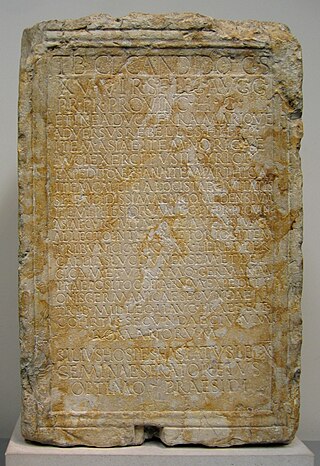This article relies largely or entirely on a single source .(August 2020) |
Marcus Nummius Tuscus (fl. 3rd century AD) was a Roman senator who was appointed consul in AD 258.
This article relies largely or entirely on a single source .(August 2020) |
Marcus Nummius Tuscus (fl. 3rd century AD) was a Roman senator who was appointed consul in AD 258.
Nummius Tuscus was the son of Marcus Nummius Senecio Albinus who had been consul in AD 227. He in turn was appointed consul prior in AD 258, alongside Mummius Bassus. [1] No further details of his career have survived.
Nummius Tuscus was perhaps the brother of Marcus Nummius Albinus who was consul ordinarius in AD 263, and he may have been the father of Marcus Nummius Tuscus, who was consul in AD 295. According to the notoriously unreliable Historia Augusta , on one occasion he accompanied the emperor Valerian to the city of Byzantium where they visited some public baths. [2]
Virius Lupus was a Roman soldier and politician of the late 2nd and early 3rd century.
Lucius Marius Maximus Perpetuus Aurelianus was a Roman biographer, writing in Latin, who in the early decades of the 3rd century AD wrote a series of biographies of twelve Emperors, imitating and continuing Suetonius. Marius's work is lost, but it was still being read in the late 4th century and was used as a source by writers of that era, notably the author of the Historia Augusta. The nature and reliability of Marius's work, and the extent to which the earlier part of the HA draws upon it, are two vexed questions among the many problems that the HA continues to pose for students of Roman history and literature.
Quintus Anicius Faustus was a Roman military officer and senator who was appointed suffect consul in AD 198.
The gens Ceionia or gens Caeionia or the Caeionii family was an ancient Roman senatorial family of imperial times. The first member of the gens to obtain the consulship was Lucius Ceionius Commodus in AD 78. The rise of this family culminated in the elevation of the emperor Lucius Verus, born Lucius Ceionius Commodus, in AD 161.
Marcus Nummius Umbrius Primus Senecio Albinus was a Roman senator who was appointed consul in AD 206 with Lucius Fulvius Gavius Numisius Petronius Aemilianus as his colleague.
Nummius Tuscus was a Roman senator who was appointed consul in AD 295.
Gaius Domitius Dexter was a Roman senator who was appointed consul twice: firstly as suffect consul prior to AD 183, and secondly as ordinary consul in AD 196 with Lucius Valerius Messalla Thrasea Priscus as his colleague.
Titus Flavius Claudius Sulpicianus was a Roman statesman who served as Senator and Consul suffectus. He unsuccessfully attempted to succeed his son-in-law Pertinax as Emperor in 193.
Pollienus Auspex was a Roman military officer and senator who was appointed suffect consul sometime between AD 170 and 174. His praenomen is thought to be Tiberius.
Marcus Umbrius Primus was a Roman senator who was appointed suffect consul around AD 185.
Marcus Nummius Senecio Albinus was a Roman senator who was appointed consul in AD 227 with Marcus Laelius Fulvius Maximus Aemilianus. Nothing else of his career has been preserved.
Marcus Nummius Albinus was a Roman senator who was appointed consul twice, first as a suffectus sometime around AD 240, and secondly as an ordinarius in AD 263.
Quintus Hedius Rufus Lollianus Gentianus was a Roman military officer and senator who was appointed consul suffectus in around AD 186–188.
Publius Catius Sabinus was a Roman military officer and senator who was appointed consul twice.
Gaius Catius Clemens was a Roman military officer and senator who was appointed suffect consul around AD 235.
Gaius Caesonius Macer Rufinianus was a Roman military officer and senator who was appointed suffect consul in around AD 197 or 198. He was the first member of gens Caesonia to hold a consulship.
Marcus Cocceius Anicius Faustus Flavianus was a Roman senator who was appointed suffect consul sometime around AD 250/252.

Tiberius Claudius Candidus was a Roman general and senator. He played an important role supporting Septimius Severus in the struggle for succession following the assassination of the emperor Pertinax in 193 CE.
The gens Nummia was a plebeian family at ancient Rome. Members of this gens appear almost exclusively under the Empire. During the third century, they frequently obtained the highest offices of the Roman state.